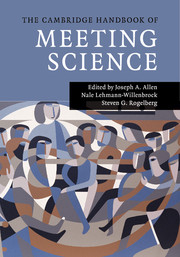Book contents
- The Cambridge Handbook of Meeting Science
- The Cambridge Handbook of Meeting Science
- Copyright page
- Dedication
- Contents
- Tables
- Figures
- Contributors
- Book part
- Part I Introduction
- Part II Premeeting Activities and Context
- Part III The Meeting Itself
- Part IV Special Types of Meetings
- Part V Synthesis and Conclusion
- Book part
- Author Index
- Subject Index
- References
27 - Implementing After-Action Review Systems in Organizations
Key Principles and Practical Considerations
from Postevent Meetings
Published online by Cambridge University Press: 05 August 2015
- The Cambridge Handbook of Meeting Science
- The Cambridge Handbook of Meeting Science
- Copyright page
- Dedication
- Contents
- Tables
- Figures
- Contributors
- Book part
- Part I Introduction
- Part II Premeeting Activities and Context
- Part III The Meeting Itself
- Part IV Special Types of Meetings
- Part V Synthesis and Conclusion
- Book part
- Author Index
- Subject Index
- References
Summary
Actors in high-reliability organizations often form meetings to discuss incidents and learn from them. Such after-action reviews (AARs) are structured opportunities for shared retrospective learning, innovation development, and continuous improvement. Research on AARs has examined the meeting-level antecedents and outcomes associated with various elements of AARs, but has generally stopped short of considering how they should influence and respond to the organizations in which they are situated. After connecting the functions of AARs using the theoretical frameworks of collective sensemaking, organizational learning, and knowledge management, this chapter presents an input-process-output model of AAR systems that accounts for a range of extra-meeting factors that influence and are influenced by the content of retrospective discussion. It also describes best practices and directions for future research associated with these inputs, processes, and outputs.
Information
- Type
- Chapter
- Information
- The Cambridge Handbook of Meeting Science , pp. 634 - 660Publisher: Cambridge University PressPrint publication year: 2015
References
Accessibility standard: Unknown
- 6
- Cited by
